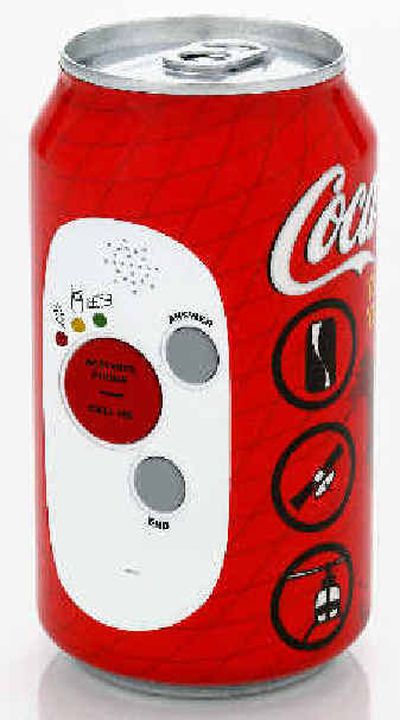Coke can has military buzzing

NEW YORK — There’s a new security threat at some of the nation’s military bases — and it looks uncannily like a can of Coke.
Specially rigged Coke cans, part of a summer promotion, contain cell phones and global positioning chips. That has officials at some installations worried the cans could be used to eavesdrop, and they are instituting protective measures.
Coca-Cola Co. says such concerns are nothing but fizz.
Mart Martin, a Coca-Cola spokesman, said no one would mistake one of the winning cans from the company’s “Unexpected Summer” promotion for a regular Coke.
“The can is dramatically different looking,” he said. The cans have a recessed panel on the outside and a big red button. “It’s very clear that there’s a cell phone device.”
Winners activate it by pushing the button, which can only call Coke’s prize center, he said. Data from the GPS device can only be received by Coke’s prize center. Prizes include cash, a home entertainment center and an SUV.
“It cannot be an eavesdropping device,” he said.
Nonetheless, military bases, including the U.S. Army Armor Center at Fort Knox, Ky., are asking soldiers to examine their Coke cans before bringing them in to classified meetings.
“We’re asking people to open the cans and not bring it in if there’s a GPS in it,” said Master Sgt. Jerry Meredith, a Fort Knox spokesman. “It’s not like we’re examining cans at the store. It’s a pretty commonsense thing.”
Sue Murphy, a spokeswoman for Wright-Patterson Air Force Base in Dayton, Ohio said personal electronic devices aren’t permitted in some buildings and conference rooms on base.
“We’ve taken measures to make sure everyone’s aware of this contest and to make sure devices are cleared before they’re taken in” to restricted areas, she said.
“In the remote possibility a can were found in one of these areas, we’d make sure the can wasn’t activated, try to return it to its original owner and ask that they activate it at home,” she said. “It’s just another measure we have to take to keep everyone out here safe and secure.”
The Marine Corps said all personnel had been advised of the cans and to keep them away from secure areas.
Paul Saffo, research director at The Institute for the Future, a technology research firm, compared the concern about the Coke cans to when the Central Intelligence Agency banned Furbies, the stuffed toys that could repeat phrases.
“There’s things generals should stay up late at night worrying about,” he said. “A talking Coke can isn’t one of them.”
But Bruce Don, a senior analyst at the Rand Corp. said the military’s concern is rational and appropriate.
“There’s a lot of reason to worry about how that technology could be taken advantage of by a third party without Coke’s knowledge,” he said.
“I wouldn’t worry if one was in my refrigerator, but if you had a sensitive discussion or location, it’s not inconceivable the thing could be used for something it was not designed for,” he said.
Martin said Thursday the world’s largest soft drink maker has received phone calls inquiring about the promotion from Hill Air Force Base in Ogden, Utah, and from a military base in Anchorage, Alaska. The callers did not mention any concerns, and Coke has not been contacted by the bases in Ohio and Kentucky, Martin said.
Asked if Coke would curtail the promotional campaign because of the security issues raised, Martin said, “No. There’s no reason to.”